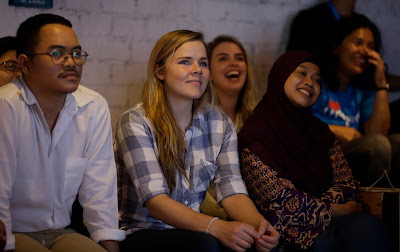Releasing 1,000 handmade wooden planes
into the air as a symbol of young generations flying higher, the scouts kicked
off the 10th National Pramuka Jamboree at Cibubur
Scout Camp on
Sunday in a vibrant, yet solemn opening ceremony. 25,000 scouts, leaders and
members from across Indonesia stood gloriously side by side filling up the
entire stadium, in distinctive formal uniforms with red-and-white scarves
proudly fastened around their necks.
 |
Happy girl scouts during the opening ceremony
© UNICEF Indonesia/Rodrigo Ordonez/2016
|
Singing, dancing or saluting in
harmony, one could not help but feel the excitement and pure joy of all
participants – from club scouts to adult members to international visitors –
eager for their week of learning, sharing ideas and making friends, to begin. Colourful
and energetic performances from the provinces combined with some occasional
earnest moments to pay respect to a fallen hero or to the national anthem, the
spirit of friendship, unity and peace reigned over the entire camp.
“Beautiful” simply said a smiling
14-year old Girl Scout from North Sulawesi about the opening ceremony snapping
selfies with her friends. The friends Indah, Nanda, Viani and Miracle added “The
opening ceremony was so interesting. There are many scouts with different
religions but we are still able to be friends with each other”.
 |
Girl Scouts from North Sulawesi
©UNICEF Indonesia/Ariunzaya Davaa/2016
|
UNICEF was there too, to help these
young scouts to harness the same technology they use for selfies to raise their
voices higher and louder in society, through the youth engagement platform U-Report.
Recognizing the important role technology plays in adolescent and young
people’s lives, UNICEF brought U-Report to the jamboree to encourage as many
scouts to sign up as possible and get their voices heard.
The scout spirit and oath has not
changed, but the technology was not the same as the last Jamboree five years
ago. Walking around the grounds of Cibubur, enthusiasm and impatience of the
young scouts filled the air, with their digital cameras, smart phones and iPads
wanting to capture every single moment or share a selfie with someone they just
met.
And there was plenty to capture.
Rainbow of flags representing provinces raised on both sides of the pathway
starting from the entrance all the way to the campsite. Hundreds of small camps
– homes of the scouts for the next week - are set up across the camp ground;
each have their distinctive entrance ways decorated with colourful banners,
photos and slogans. The children singing, dancing and doing their scout routine
can be found at the camps. Probably there will be hundreds of thousands of
images snapped, shared, posted and tweeted by the participants over the week
recording their journey and experience that will undeniable shape their lives
and their future.
So if they’re going to be tweeting,
snapping, sharing and posting anyway, why not make it really count?
U-Report Indonesia uses that same technology
and social media to give young people an opportunity to speak out on the issues
that they care about, through polls on specific topics and encouraging feedback.
Pramuka Indonesia has 20 million members, so the National Jamboree was the
perfect event to start spreading the word and encourage the scouts to join more
than 2 million U-Reporters worldwide. Thousands of scouts are expected to
participate in the interactive sessions each day, which will explain what
U-Report is all about and how to use it in twitter and facebook to communicate
and share information.
Even
President of Indonesia Jokowi highlighted the vital role young people play in the country’s
development in his opening remarks and called them to be strong, brave and
positive. Standing gracious for the entire
opening as the Head of the Ceremony, he also stated the importance of information
technology and its proper use by young people. “Use social media to inspire
young people to join the scouts. However, social media is not a tool for you to
hurt or bully each other” he remarked.
 |
President Jokowi delivers opening remarks
© UNICEF Indonesia/Rodrigo Ordonez/2016
|
Indeed,
bullying is one of many subjects that U-Reporters can and already have shared
their views about. The results show that 50
per cent of children in Indonesia are bullied at school. These statistics are
important to understand the scope of a problem and its impact on children’s
well-being so that the government and other stakeholders can make informed
decisions to stop these harmful behaviours. U-Report Indonesia conducts weekly
polls on topics such as these and ensures that the voices of poll participants
makes their way to decision-makers.
There are currently over 27,000
active U-Reporters across Indonesia who have already raised their voices to
influence national and even global discussions on issues that are relevant to
them. Examples include polls on the Sustainable Development Goals prior to the
UN General Assembly session in September 2015 where the SDGs were endorsed, and
on priorities to address climate change, which were presented during the COP21
Climate Change Conference in Paris, among others. Moreover, UNICEF used
U-Report to gather children’s and adolescents’ input to a National Strategy on
the Elimination of Violence in Childhood, which was launched by the Government
in January this year. Around 4,000 children and young people (aged 14-25 years)
participated in the poll.
Charged with youth spirit and
excitement, the National Jamboree is truly one of a kind bringing together
scouts from Indonesia and beyond to create memories and friendships for them to
take home and cherish for a lifetime. This
year technology has brought the experience to a next level where the scouts are
not only bringing hundreds of selfies back home, but most importantly the
feeling of being empowered and being heard like never before.





































